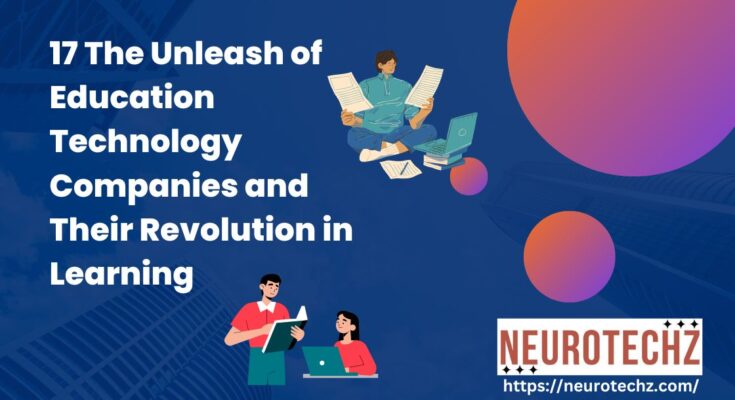Education Technology Companies have emerged as a disruptive force in education
Education technology firms have been instrumental in transforming conventional teaching strategies in the past few years, elevating instruction to a more personalized, interactive, and accessible level. This article examines how Education Technology Companies have developed and affected the educational environment and what opportunities and problems they have encountered.
The Growth of Education Technology Companies
Technology breakthroughs that have made room for creative learning approaches have caused a radical change in the educational landscape in recent years. Education Technology Companies primarily focused on using digital tools to improve the learning experience have been instrumental in this paradigm change. This article explores how Education Technology Companies have grown to new heights and how this has affected the outlook for education.
Historical Overview
Computers first appeared in the 20th century, when Education Technology Companies emerged. Training programmes and instructional software on computers were among the first developments. However, the internet’s broad availability and digital technology improvements gave notation technology a real boost in the 21st century.
Pioneering Companies
For the Education Technology Companies, several trailblazing businesses set the way. Online video courses were first popularised by businesses like Khan Academy, established in 2008, offering students accessible, excellent educational resources worldwide. The emergence of Massive Open Online Courses (MOOCs) and their ability to provide students with access to courses from world-class universities is also a result of platforms like Coursera and edX.
Impact on Traditional Education
The development of technology has completely changed many facets of our lives in the last several years, including schooling. Technology integration is causing significant changes to the traditional education system, which has mostly stayed the same for decades. The significant effects of technology on conventional Education Technology Companies are examined in this essay, along with how these effects will affect education in the future.
Accessibility and Inclusivity
Due to the advancements in education technology, people who may not have had access to traditional educational materials can now learn, even in remote locations. Democratising Education Technology Companies and promoting inclusivity has been especially important in underprivileged or distant places.
Personalized Learning
Offering individualized learning experiences is one of the Education Technology Companies’ main benefits. Utilizing artificial intelligence and data analytics, adaptive learning platforms customize course materials to each student’s unique needs, capabilities, and shortcomings. This tailored approach improves pupil engagement and comprehension.
Blended Learning Models
Education Technology Companies have made blended learning approaches more accessible through online materials and traditional classroom instruction. Teachers can use this hybrid method to retain the advantages of in-person engagement while utilizing technology to support individualized learning.
Key Technological Innovations
Innovations are still advancing society, changing industries, and improving our everyday lives in the fast-paced world of technology. Future-shaping, boundary-pushing, and opportunity-creating key technology advancements are vital. These developments, which range from blockchain to artificial intelligence, could drastically change how we live, work and communicate. In this piece, we will look at some significant technological advancements that are now creating waves and influencing the future.
Artificial Intelligence (AI) in Education
Education Technology Companies have changed dramatically with the introduction of artificial intelligence. Artificial intelligence (AI)-enabled technologies can evaluate student performance, spot learning trends, and offer immediate feedback. One example of an intelligent tutoring system that improves learning responds to students’ progress and provides tailored support.

Virtual Reality (VR) and Augmented Reality (AR)
There are now more opportunities in schooling because of virtual and augmented reality. Students’ comprehension of complex subjects is improved by immersive experiences, which allow them to visit distant locations, conduct virtual experiments, and investigate historical events. Learning is becoming more engaging because of this technology.
Gamification
Learning may now be more engaging and joyful with the growing popularity of gamification in educational technologies. Students are motivated by instructional simulations and games, which add entertainment value to learning. Achievement and advancement are encouraged by gamified features like badges and awards.
Challenges Faced by Education Technology Companies
The way that educators and students teach and learn has been completely transformed in recent years by education technology or Education Technology Companies. Global connectivity, interactive instruction, and personalized learning have all been made possible by the creative ways technology has been incorporated into schools. Education IT firms, however, still have a lot of obstacles to overcome before they can truly succeed in this changing environment, even with notable achievements.
Infrastructure and Connectivity
Even with the advancements, there are still issues, especially in areas with poor technology infrastructure and restricted internet connectivity. For their products to be adopted by more people, Education Technology Companies must address these problems.
Data Privacy and Security
Privacy and security are issues that are brought up by the gathering and use of student data. To secure sensitive data and foster confidence among users, educators, and parents, Education Technology Companies must prioritize effective data protection procedures.
Teacher Training and Integration
Teachers’ readiness and competence are critical to any successful education technology deployment. Thorough training programmes are vital to provide educators with the necessary abilities to incorporate technology into their pedagogy successfully.
Future Trends and Opportunities
For individuals and organizations, staying updated with emerging trends and opportunities has become essential as we navigate the always-changing landscape of technology, business, and societal shifts. Although there are many obstacles to overcome due to the dynamic nature of the global market, there are also many intriguing opportunities. To facilitate innovation, expansion, and achievement, we examine some significant future trends in this piece and the opportunities they present.
Continued Growth of Online Learning
Because it gives students more freedom, online learning is likely to remain popular. Education Technology Companies will develop more advanced platforms and technologies to improve the online learning experience as they continue to innovate.
Expansion of STEM Education
Education in Science, Technology, Engineering, and Mathematics (STEM) is becoming increasingly important. To prepare students for careers in these in-demand industries, Education Technology Companies will be essential in creating dynamic and captivating STEM learning materials.
Collaboration and Partnerships
Governments, other stakeholders, and educational institutions are increasingly joining forces with Education Technology Companies. A more unified and integrated strategy for utilizing technology in education can be developed through collaborative efforts to address obstacles.
The Growth of Online Learning Companies
Because there is a growing need for accessible and flexible education, online learning companies have increased. From students pursuing higher education to working professionals looking to upskill, many learners have been drawn to the convenience of studying from anywhere at any time.
These businesses design interactive tests, video lectures, discussion boards, and other forms to ensure their learning materials are exciting and valuable. Online learning has become increasingly popular because of the accessibility of its resources and the flexibility to move at a person’s own pace.
Benefits of Online Learning Companies
Flexibility
Online education has the most excellent flexibility. Students can access course materials and participate in discussions anytime to accommodate various schedules and lives. This flexibility will particularly benefit People in balancing job, family, or other responsibilities.
Cost-Effectiveness
Traditional education can be costly in light of tuition, books, and transportation expenses. Instead of the financial burden that traditional educational institutions impose, online learning organizations frequently provide cheaper options, giving students access to high-quality education.
Global Accessibility
The obstacles to education posed by geography have vanished. Through online learning platforms, students can enrol in courses offered by reputable universities and receive instruction from highly qualified instructors from anywhere in the world. Because of its worldwide accessibility, education is enhanced, and diversity is fostered.
Personalized Learning
Online platforms use adaptive learning technologies to accommodate different learning styles and rates. A more profound comprehension of the material is encouraged by this individualized approach, which guarantees that students can concentrate on their areas of weakness.
Challenges Faced by Online Learning Companies
Lack of Face-to-Face Interaction
Flexibility is a benefit of online learning, but it frequently lacks the in-person connection of traditional classroom settings. Collaboration and a sense of community may be impacted by difficulties forming relationships with teachers and students.
Quality Assurance
Ensuring the quality of online education is quite challenging. Continuing to uphold integrity and uniform standards is essential as the number of online learning companies rises. Accreditation and certification procedures are essential to prove the credibility of these platforms.
Technological Barriers
A barrier that prevents some people from participating in online courses is access to dependable internet and technology. A “digital divide” might be created by this technical barrier, which would worsen already existing educational disparities.
Limited Hands-On Learning
Online learning may only sometimes be able to deliver the practical components that specific disciplines demand. Online education still needs to find efficient methods for integrating hands-on learning into virtual environments.

The Future of Online Learning Companies
Online learning enterprises have a bright future despite their obstacles. Further innovation in online learning is likely sparked by the continuous developments in technology and the lessons learnt from the quick switch to remote learning during times of global crisis.
Integration of Emerging Technologies
Thanks to artificial intelligence and virtual and augmented reality, online learning will undergo a significant transformation. Through interactive information, virtual labs, and realistic simulations, these technologies can improve the learning process.
Collaboration with Traditional Institutions
Connections between traditional educational institutions and online learning enterprises are growing. A mixed learning experience for students is made possible by this partnership, which enables the incorporation of online courses into traditional degree programmes.
Emphasis on Lifelong Learning
The necessity of lifelong learning intensifies as the labour market changes. With short courses, micro-credentials, and professional development opportunities, online learning firms are well-positioned to meet the growing need for lifetime learning.
The Educational Business Ecosystem
Companies that provide educational technologies, tutoring services, online learning platforms, and other related enterprises are all considered educational businesses. These businesses use data analytics, technology, and personalized learning strategies to provide individualized learning opportunities.
Online Learning Platforms
The growing popularity of online learning platforms is one of the most prominent developments in the educational businesses. Students of all ages can learn new skills and information with the flexibility and accessibility offered by these platforms. Internet learning systems accommodate various learning preferences and styles, from interactive e-learning modules to Massive Open Online Courses (MOOCs).
Internet education has several benefits. Gone are geographical restrictions and chances for lifelong learning because students can access courses anytime and from any location. One’s learning experience can also be tailored to their strengths and limitations by having the flexibility to advance quickly.
Tutoring Services
Educational businesses are also crucial in terms of individualized tutoring services. Understanding that students have different learning needs, these companies provide small or one-on-one sessions that enable personalized attention and support. Tutoring services close gaps and offer focused help with various academic areas, test preparation, and skill development.
Tutoring services are also developing beyond the conventional in-person paradigm. These days, many platforms provide virtual tutoring, linking students with experienced teachers worldwide using interactive technologies and video conferences. It also allows educators to reach a larger audience and increases access to high-quality education.
Challenges and Opportunities
There are obstacles even if the educational industry is growing. Some of the obstacles that must be overcome are those related to technology access, the digital divide, and the requirement for efficient tools for quality control. But there are also chances for creativity and cooperation because of these difficulties.
Through cooperation, politicians, educational businesses, and corporations can build all-encompassing solutions to address concerns about fairness, accessibility, and educational quality. A more robust and inclusive educational ecosystem can be achieved through public-private partnerships, infrastructure development, and supportive legislation.
Summary
Education Technology Companies that provide have revolutionized teaching and learning and have become agents of change in the education sector. Prospects are intriguing because technology constantly evolves and how dedicated we are to solving problems. The education environment is about to change, with more accessibility, individualized learning, and the acquisition of critical skills for the digital age being promised by Education Technology Companies as they work to build creative solutions.




